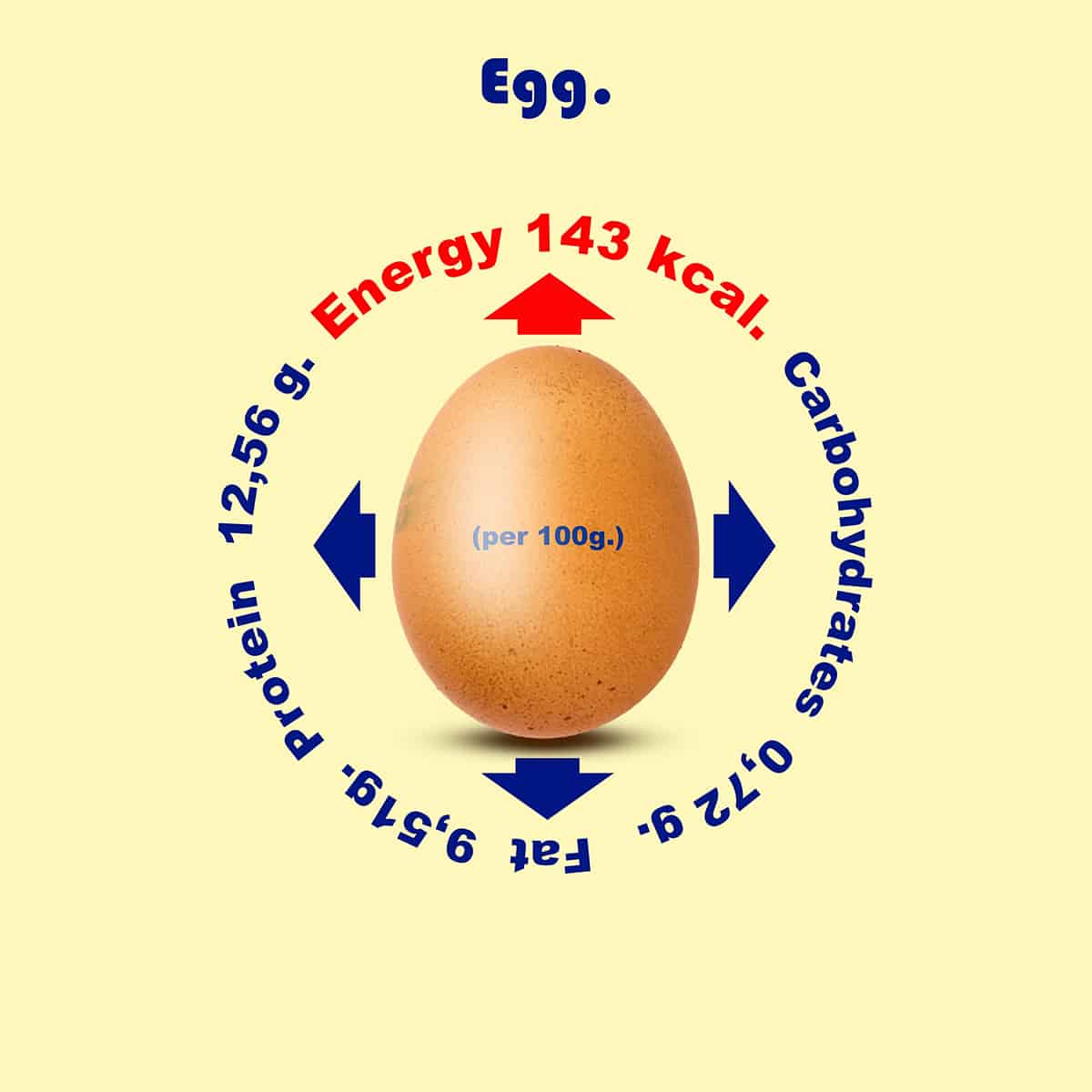Eggs come in various shapes and sizes, and their weight can vary quite a bit. The weight of an egg is important for many reasons, such as cooking, baking, and nutrition. Different factors, like the hen’s breed, age, diet, and environment, can influence the weight of an egg.
In the United States and other countries, eggs are sorted into categories based on their weight. Using the USDA’s sizing standards, the weight of an egg based on size is as follows:
- Peewee—35.4 grams (1.25 oz.)
- Small—42.5 g (1.5 oz.)
- Medium—49.6 g (1.75 oz.) large—56.8 g (2 oz.)
- Extra Large—63.8 g (2.25 oz)
- Jumbo—70.9 g (2.5 oz.)
In this guide, we will explore the fascinating world of egg weights. We’ll dive into the history of egg measurements, factors that affect egg weight, and the different size categories used around the world.
Factors Influencing Egg Weight

Egg weight can be influenced by different factors, such as the hen’s breed, age, diet, and environment.
Breed
Some breeds of hens, like Rhode Island Reds or Plymouth Rocks, are known for laying larger eggs than other breeds, like Leghorns. Each breed has its unique characteristics, which affect the size and weight of the eggs they produce.
Age
As hens get older, their eggs tend to become larger. Young hens usually lay smaller eggs, while more mature hens produce bigger ones. This happens because the hen’s reproductive system matures over time.
Diet
A balanced and nutritious diet helps hens produce good-quality eggs. If a hen’s diet lacks essential nutrients, it may affect the weight and quality of the eggs. Providing hens with proper food ensures they lay eggs with a healthy weight.
Environment
The environment in which hens live can also influence egg weight. Factors like temperature, stress, and living space can impact the size of the eggs they lay. Hens that live in a comfortable and stress-free environment are more likely to produce eggs with a consistent weight.
Egg Size Categories
Eggs are sorted into different size categories based on their weight. These categories help us know what to expect when we buy eggs at the store.
USDA Standards
In the United States, the USDA has six size categories: Peewee, Small, Medium, Large, Extra-Large, and Jumbo. Each category has a specific weight range. For example, large eggs weigh between 2.0 and 2.25 ounces, while extra-large eggs weigh between 2.25 and 2.5 ounces.
International Size Categories
Other countries have their own egg-size categories. In the European Union, eggs are classified as Small, Medium, Large, and Extra-Large. In Australia, eggs are labeled from Size 1 to Size 7, with Level 1 being the smallest and Level 7 the largest. Canada uses a similar system to the United States but labels the smallest eggs as “Pee Wee” instead of “Peewee.”
Egg Weight and Culinary Applications
Egg weight plays a crucial role in various cooking and baking activities. Knowing how the weight of an egg affects your recipes can help you achieve better results in the kitchen.
1. Baking Considerations

In baking, the weight of eggs is essential for creating the right texture and structure. Recipes often call for a specific size or weight of eggs to ensure the right balance of ingredients. Using eggs of different weights might cause your baked goods to be too dry or too moist.
2. Cooking Techniques
In cooking, egg weight can impact the final outcome of dishes like omelets or scrambled eggs. For example, using larger eggs in an omelet may require longer cooking times or adjusting other ingredients to maintain the right consistency.
3. Recipes and Substitutions
When a recipe calls for a specific egg size, it’s best to follow the instructions. However, if you don’t have the required size, you can make substitutions. For instance, you can use two small eggs in place of one large egg, or vice versa. Just remember to adjust the other ingredients accordingly to maintain the right balance.
Nutritional Implications of Egg Weight

The weight of an egg can also influence its nutritional content. As the size of an egg increases, so do the calories, proteins, and other nutrients.
1. Caloric Content
Larger eggs contain more calories than smaller eggs. For example, a large egg has about 72 calories, while a medium egg has approximately 63 calories. It’s important to consider the calorie difference if you’re watching your calorie intake.
2. Macronutrient Breakdown
The amount of protein, fat, and carbohydrates in an egg also varies with its size. Larger eggs have more protein and fat than smaller ones. For instance, a large egg contains around 6.5 grams of protein, while a medium egg has about 5.5 grams.
3. Cholesterol Considerations
Egg yolks contain cholesterol, and larger eggs have more yolk than smaller ones. If you’re monitoring your cholesterol intake, you may want to choose smaller eggs or use only egg whites in your recipes, as the whites are cholesterol-free.
FAQs
1. Why are there different egg sizes in a carton?
Different egg sizes in a carton may occur due to natural variations in egg production. Hens can lay eggs of different sizes depending on factors like their age, diet, and breed. While egg producers aim to sort and package eggs according to size, slight variations may still appear within a carton.
3. Can I use different-sized eggs interchangeably in recipes?
Using different-sized eggs interchangeably in recipes can affect the outcome. In most cases, you can substitute one large egg for one medium or extra-large egg without a problem. However, for recipes that require precise measurements, like baked goods, using eggs of different sizes may alter the texture or structure. In these cases, it’s better to measure the egg volume (in tablespoons or cups) to ensure consistency.
3. How can I ensure I’m buying the right size of eggs for my needs?
To buy the right size eggs for your needs, consider the recipes you’ll be using them for. If precision is not crucial, large eggs are a versatile option. For recipes requiring exact measurements, choose the egg size specified. Remember to check the weight category on the packaging and consider buying eggs from a trusted producer to ensure consistent sizing.







Leave a Reply